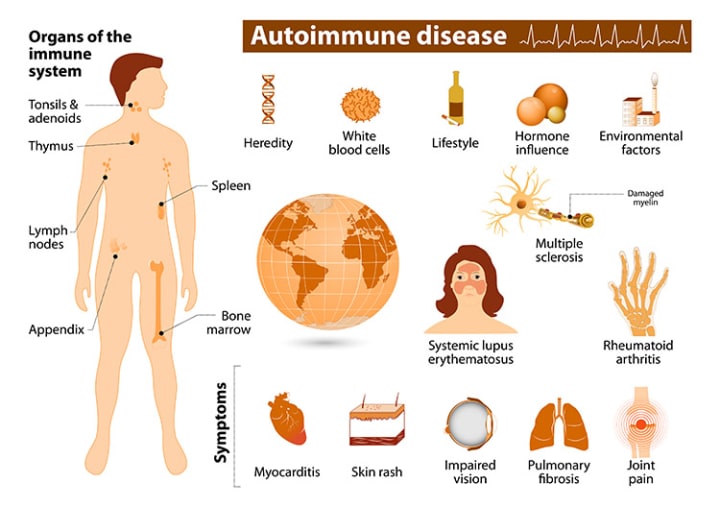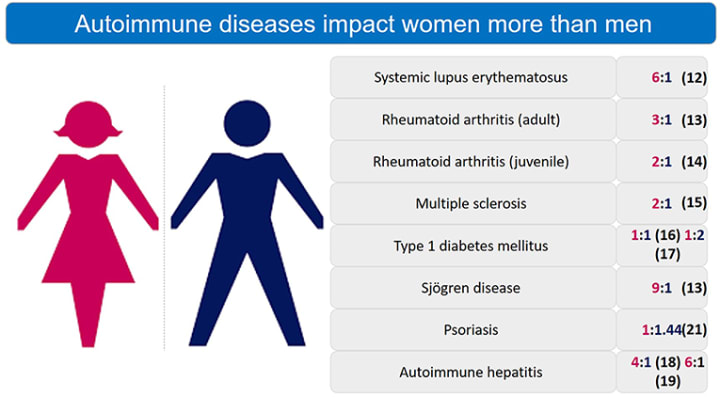Autoimmune Diseases: Why Women are More Vulnerable than Men?
The impact of lifestyle on autoimmune diseases

Autoimmune Diseases: Why Women are More Vulnerable than Men?
Autoimmune diseases have become a common medical concern globally, affecting millions of people each year, and have significant impacts on individuals' quality of life, including physical, emotional, and financial well-being. These conditions occur when the immune system of the body mistakenly attacks healthy cells, tissues, and organs. Autoimmune diseases pose a considerable burden on healthcare systems and economies as the costs of diagnosis, treatment, and management of autoimmune diseases can be substantial, both for individuals and society as a whole.
Research into autoimmune diseases is ongoing, with a focus on improving the diagnosis, treatment, and management of these conditions. Increased awareness of autoimmune diseases and their impact on individuals and society is also essential for advocating for better healthcare policies and resources to support those living with these conditions.
Although autoimmune diseases can affect anyone, statistics have shown that women are more prone to these diseases than men. In this article, we will delve into the reasons why women are more vulnerable to autoimmune diseases such as lupus, rheumatoid arthritis, and multiple sclerosis.
Table of Contents
- Introduction
- World Wide statics on autoimmune diseases
- What are autoimmune diseases?
- Autoimmune diseases and gender
- The role of hormones
- Genetics and autoimmune diseases
- The impact of lifestyle on autoimmune diseases
- Pregnancy and autoimmune diseases
- Diagnosing autoimmune diseases in women
- Treatment options for autoimmune diseases
- Self-care and management of autoimmune diseases
- The emotional toll of autoimmune diseases
- Supporting women with autoimmune diseases
- Coping with autoimmune diseases
- Future of autoimmune diseases research
- Conclusion
- FAQs
Introduction
Autoimmune diseases refer to a group of conditions in which the body's immune system attacks its healthy cells and tissues. These diseases can range from mild to severe and can affect different organs and systems of the body. There are over 80 different types of autoimmune diseases, and their symptoms vary widely, making diagnosis challenging. However, autoimmune diseases are more prevalent in women than men, with women being three times more likely to develop these diseases. The reasons for this gender disparity have been the subject of much research and debate.
World Wide statics of autoimmune diseases
Autoimmune diseases affect people worldwide, and there is no particular country or continent that is more affected than others. However, some autoimmune diseases may be more prevalent in certain regions due to genetic or environmental factors.
For example, lupus is more common in African American, Hispanic, and Asian populations than in Caucasians. In contrast, multiple sclerosis is more prevalent in Northern European populations.
Rheumatoid arthritis affects people of all races and ethnicities, but it is more common in women and people over 60 years old.
Here are some estimates of autoimmune disease prevalence in different continents based on available data:
North America (including the United States and Canada) has a relatively high prevalence of autoimmune diseases, with an estimated 8% of the population affected.
In Europe, the prevalence of autoimmune diseases varies between countries, but overall, it is estimated that around 5-8% of the population is affected.
In Africa, the prevalence of autoimmune diseases is lower compared to other continents, with some estimates suggesting that autoimmune diseases affect less than 1% of the population.
In Asia, the prevalence of autoimmune diseases varies widely between countries, but overall, it is estimated that around 2-5% of the population is affected.
It is worth noting that these estimates are not comprehensive, and autoimmune disease prevalence may vary within countries and regions. Additionally, due to differences in data collection and reporting, it may be challenging to compare autoimmune disease prevalence between different countries and continents.
Overall, the incidence and prevalence of autoimmune diseases vary depending on the specific condition and geographic location. However, it is clear that autoimmune diseases are a global health issue that affects millions of people worldwide, regardless of their race, ethnicity, or nationality.
What are autoimmune diseases?

Autoimmune diseases are conditions that arise when the immune system fails to differentiate between healthy cells and harmful ones. In response, the immune system produces antibodies that attack and destroy healthy cells, leading to inflammation, pain, and damage to the affected organ or tissue. Some of the most common autoimmune diseases include rheumatoid arthritis, lupus, multiple sclerosis, psoriasis, and inflammatory bowel disease.
Autoimmune diseases and gender

Research shows that women are more susceptible to autoimmune diseases than men. According to the American Autoimmune Related Diseases Association, about 75% of autoimmune disease patients in the United States are women. The reasons for this gender disparity are not yet fully understood. However, studies suggest that hormonal factors, genetics, and environmental triggers may play a role.
The role of hormones
Hormonal factors have been shown to play a significant role in the development of autoimmune diseases. Women have fluctuating hormone levels throughout their menstrual cycles, pregnancy, and menopause. Hormonal changes during these periods can affect the immune system's response to infections, making women more susceptible to autoimmune diseases. For instance, studies have shown that estrogen, a hormone produced at higher levels in women, can increase the number of immune cells that attack the body's tissues.
Genetics and autoimmune diseases
Genetic factors also play a role in the development of autoimmune diseases. Some studies suggest that certain genes may make individuals more susceptible to autoimmune diseases. Women are more likely to inherit these genes from their parents, which may explain why they are more prone to these diseases. However, it's worth noting that genetics alone cannot account for the gender disparity in autoimmune diseases. Environmental factors also play a crucial role.
The impact of lifestyle on autoimmune diseases
Environmental factors such as diet, stress, infections, and exposure to toxins can trigger autoimmune diseases. Women are more likely to be exposed to these triggers due to their lifestyles. For instance, women tend to have more stressors, such as caregiving responsibilities, which can weaken the immune system. Similarly, some studies have shown that a diet high in sugar and fat can increase the risk of developing autoimmune diseases. Exposure to toxins such as cigarette smoke and pollution can also increase the risk
Pregnancy and autoimmune diseases

Pregnancy can also impact the development of autoimmune diseases in women. Pregnancy leads to significant changes in a woman's immune system to protect the developing fetus. These changes can increase the risk of developing autoimmune diseases or worsen existing ones. In some cases, pregnancy can even trigger autoimmune diseases that were previously dormant. This is particularly true for women with a history of autoimmune diseases, making pregnancy a high-risk period.
Diagnosing autoimmune diseases in women

Diagnosing autoimmune diseases in women can be challenging because the symptoms can mimic other conditions. Symptoms of autoimmune diseases can include fatigue, joint pain, muscle weakness, skin rashes, and fever. However, these symptoms can be vague and nonspecific, making it difficult to pinpoint the exact condition. Women may need to undergo several tests, including blood tests, imaging, and biopsies, to arrive at a correct diagnosis.
Treatment options for autoimmune diseases
Although there is no cure for autoimmune diseases, there are various treatment options available to manage symptoms and prevent damage to affected organs. Treatment options can include medications to suppress the immune system, reduce inflammation, and manage pain. Physical therapy and occupational therapy can also help to manage symptoms and improve quality of life. In some cases, surgery may be necessary to repair damaged organs or tissues. The specific treatment for each autoimmune disease varies, depending on the type and severity of the condition.
Some commonly used treatments for autoimmune diseases include:
Nonsteroidal anti-inflammatory drugs (NSAIDs): Used to reduce pain and inflammation, NSAIDs are commonly used for conditions such as rheumatoid arthritis.
Corticosteroids: These medications are used to reduce inflammation and suppress the immune system. Corticosteroids are often used for conditions such as lupus and multiple sclerosis.
Disease-modifying antirheumatic drugs (DMARDs): These medications are used to slow the progression of autoimmune diseases such as rheumatoid arthritis and psoriasis.
Biologics: These are a newer class of medications that target specific components of the immune system to reduce inflammation and slow disease progression. Biologics are commonly used for conditions such as rheumatoid arthritis and psoriasis.
Immunomodulators: These medications work to regulate the immune system, making them useful in conditions such as lupus and multiple sclerosis.
It is essential to work with a healthcare professional to determine the best course of treatment for each individual based on their specific autoimmune disease and medical history. Additionally, lifestyle modifications such as regular exercise, healthy eating, stress management, and getting enough rest can also help manage symptoms and improve overall well-being.
Self-care and management of autoimmune diseases
In addition to medical treatments, self-care and lifestyle changes can also help manage autoimmune diseases. Women can take steps to reduce stress, maintain a healthy diet, and engage in regular exercise to improve their overall health and immune function. Avoiding smoking and exposure to toxins can also help to reduce the risk of autoimmune diseases. Women with autoimmune diseases should also take care to monitor their symptoms regularly and communicate with their healthcare providers to adjust their treatment plans as needed.
The emotional toll of autoimmune diseases
Living with an autoimmune disease can take an emotional toll on women. The unpredictability of symptoms and the chronic nature of these conditions can cause stress, anxiety, and depression. Coping with the emotional impact of autoimmune diseases is just as crucial as managing physical symptoms. Women with autoimmune diseases can benefit from joining support groups, talking to a therapist, or engaging in stress-reducing activities such as meditation or yoga.
Supporting women with autoimmune diseases
Supporting women with autoimmune diseases requires a comprehensive approach that addresses the medical, emotional, and social aspects of these conditions. Healthcare providers should work closely with their patients to develop personalized treatment plans that consider their unique needs and preferences. Providing education on self-care and lifestyle changes can also help women manage their symptoms and improve their quality of life.
Coping with autoimmune diseases
Coping with autoimmune diseases requires a multi-faceted approach that involves the self-care, medical treatment, and emotional support. Women with autoimmune diseases should prioritize their physical and emotional health, communicate regularly with their healthcare providers, and seek support from loved ones and support groups. Coping with autoimmune diseases is a journey that requires patience, resilience, and a willingness to adapt to changing circumstances.
Future of autoimmune diseases research
Research on autoimmune diseases is ongoing, with new treatments and insights into these conditions emerging every day. Advances in genetics, immunology, and technology are providing new avenues for the diagnosis and treatment of autoimmune diseases. As more research is conducted, healthcare providers will have more tools to manage autoimmune diseases and improve outcomes for women and men alike.
Conclusion
Autoimmune diseases are a significant health concern affecting millions of people worldwide. Women are more likely than men to develop these conditions, with hormonal factors, genetics, and environmental triggers playing a role. Diagnosing and managing autoimmune diseases can be challenging, but a comprehensive approach that includes medical treatment, self-care, and emotional support can improve outcomes for women living with Autoimmune diseases. Women with autoimmune diseases face unique challenges related to pregnancy and managing symptoms, but with proper care and support, they can lead fulfilling lives. Ongoing research into autoimmune diseases is providing new hope for improved diagnosis, treatment, and management of these conditions.
FAQs
Q. What are the most common autoimmune diseases that affect women?
A. The most common autoimmune diseases that affect women are lupus, rheumatoid arthritis, multiple sclerosis, Hashimoto's thyroiditis, and Sjogren’s syndrome.
Q. Can hormonal changes during menopause affect autoimmune diseases in women?
A. Yes, hormonal changes during menopause can affect autoimmune diseases in women. The decline in estrogen levels can worsen symptoms of autoimmune diseases and increase the risk of developing new ones.
Q. Are there any natural remedies for managing autoimmune diseases?
A. While there is no cure for autoimmune diseases, some natural remedies can help manage symptoms. These include turmeric, omega-3 fatty acids, probiotics, and vitamin D. However, it is essential to consult with a healthcare provider before trying any natural remedies.
Q. Can stress trigger autoimmune diseases in women?
A. Stress can trigger autoimmune diseases or worsen symptoms in women. Stress can cause the release of hormones that can affect the immune system and trigger inflammation, leading to autoimmune responses.
Q. Are autoimmune diseases hereditary?
A. Autoimmune diseases can run in families, suggesting that genetics plays a role in their development. However, environmental factors also play a role in triggering autoimmune responses in susceptible individuals.
Q. Can pregnancy affect autoimmune diseases in women?
A. Pregnancy can affect autoimmune diseases in women in various ways. Some women experience remission of symptoms during pregnancy, while others may experience a worsening of symptoms. It is essential to work closely with a healthcare provider to manage autoimmune diseases during pregnancy.
Q. How are autoimmune diseases diagnosed?
A. Autoimmune diseases are diagnosed through a combination of medical history, physical examination, laboratory tests, and imaging studies. Doctors may also perform a biopsy of affected tissue to confirm a diagnosis.
Q. What are the treatment options for autoimmune diseases?
A. The treatment options for autoimmune diseases vary depending on the specific condition and the severity of the symptoms. They may include medications, lifestyle modifications, physical therapy, and surgery.
Q. Can diet affect autoimmune diseases in women?
A. Diet can affect autoimmune diseases in women, and some foods may trigger or worsen symptoms. On the other hand, a healthy diet rich in fruits, vegetables, and whole grains may help reduce inflammation and improve overall health.
Q. Can autoimmune diseases be prevented?
A. There is no surefire way to prevent autoimmune diseases, as their development is influenced by a combination of genetic and environmental factors. However, maintaining a healthy lifestyle, including regular exercise, a nutritious diet, and stress management, may help reduce the risk of developing autoimmune diseases.
About the Creator
MANOJ KUMAR
Never Stop Dreaming: A true inspiration for anyone looking to turn their dreams into reality. From a humble background to a millionaire, my journey is a testament to the power of hard work, dedication, and an unbreakable spirit






Comments
There are no comments for this story
Be the first to respond and start the conversation.